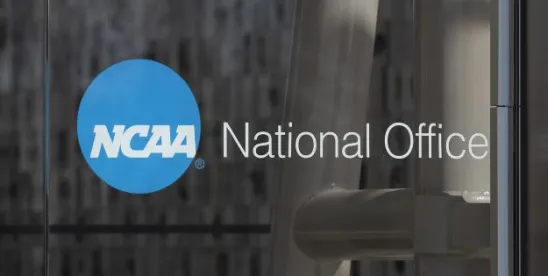The NCAA Board of Governors has voted to approve the terms of a settlement that would resolve several antitrust lawsuits against the NCAA and would require the organization to pay nearly $2.8 billion over a 10-year period to former Division I athletes and institute a revenue-sharing model between certain schools and athletes. The details of the settlement are still being negotiated. Once finalized, the agreement must be submitted for court approval.
One of the lawsuits, House v. NCAA, alleges the NCAA and its “Power 5” athletic conferences violated antitrust laws by barring athletes from receiving name, image, and likeness (NIL) compensation prior to 2021 and by prohibiting revenue-sharing from television broadcasting agreements and similar contracts with athletes.
The NCAA faces substantial risks if the House lawsuit proceeds to trial. U.S. District Court Judge Claudia Wilken, who is presiding over the lawsuit, had ruled against the NCAA in two major NIL-related cases. Federal antitrust law grants successful plaintiffs treble damages. The NCAA could be liable for as much as $20 billion in damages (which some say could force the organization into bankruptcy). A loss at trial could also result the removal of all existing constraints on NIL and revenue sharing in college athletics. The settlement would permit the NCAA to pay a lesser amount in damages while retaining more ability to regulate athlete compensation.
The nearly $2.8 billion would be in back-pay damages to former athletes who were unable to receive NIL compensation prior to the NCAA’s decision to lift the prohibition in 2021. Further, the settlement would create an optional revenue-sharing model through which power conference schools may distribute as much as $20 million a year to their student-athletes.
The settlement approved by the NCAA calls for payments to be financed primarily by reductions in annual revenue distributions to the NCAA’s members and from the NCAA’s reserve funds. The settlement is also expected to involve a reaffirmation of existing NCAA rules regulating student-athlete compensation and the creation of an enforcement infrastructure for those rules. The House settlement would be a groundbreaking moment in college athletics, whose landscape has experienced significant uncertainty surrounding the transition from athletic amateurism into something resembling a professional sports model. While the NCAA’s $2.8 billion payment has been the focus of many headlines, the House settlement’s most consequential feature may be its revenue-sharing agreement, which would be the first instance of direct profit-sharing between universities and athletes.




 />i
/>i

